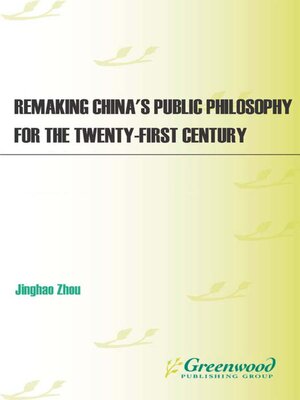
Sign up to save your library
With an OverDrive account, you can save your favorite libraries for at-a-glance information about availability. Find out more about OverDrive accounts.
Find this title in Libby, the library reading app by OverDrive.



Search for a digital library with this title
Title found at these libraries:
| Loading... |
In this book, author Jinghao Zhou uses for the first time the prism of public philosophy to examine Chinese society, modernization, globalization, and democratization as a whole. Challenging conventional thinking in China studies, he examines China systematically in seven aspects: history, ideology, economy, politics, religion, education, and China's future, and does so from both Eastern and Western perspectives. The volume asserts that the remaking of China's public philosophy is they key for the nation to achieve both economic and political prosperity, making the bold argument that this remaking can contribute profoundly not only to China's development, but to international peace and development as well.
In Remaking China's Public Philosophy for the Twenty-First Century, author Jinghao Zhou uses for the first time the prism of public philosophy to examine Chinese society, modernization, globalization, and democratization as a whole. Challenging conventional thinking in China studies, he examines China systematically in seven aspects: history, ideology, economy, politics, religion, education, and China's future, and does so from both Eastern and Western perspectives.
The volume asserts that the remaking of China's public philosophy—the very principles and precepts it now takes for granted—is they key for the nation to achieve both economic and political prosperity. Zhou aims for a peaceful revolution of China's democratization while he explores a new paradigm in China studies, making the bold argument that this remaking can contribute profoundly not only to China's development, but to international peace and development as well.
In Remaking China's Public Philosophy for the Twenty-First Century, author Jinghao Zhou uses for the first time the prism of public philosophy to examine Chinese society, modernization, globalization, and democratization as a whole. Challenging conventional thinking in China studies, he examines China systematically in seven aspects: history, ideology, economy, politics, religion, education, and China's future, and does so from both Eastern and Western perspectives.
The volume asserts that the remaking of China's public philosophy—the very principles and precepts it now takes for granted—is they key for the nation to achieve both economic and political prosperity. Zhou aims for a peaceful revolution of China's democratization while he explores a new paradigm in China studies, making the bold argument that this remaking can contribute profoundly not only to China's development, but to international peace and development as well.






